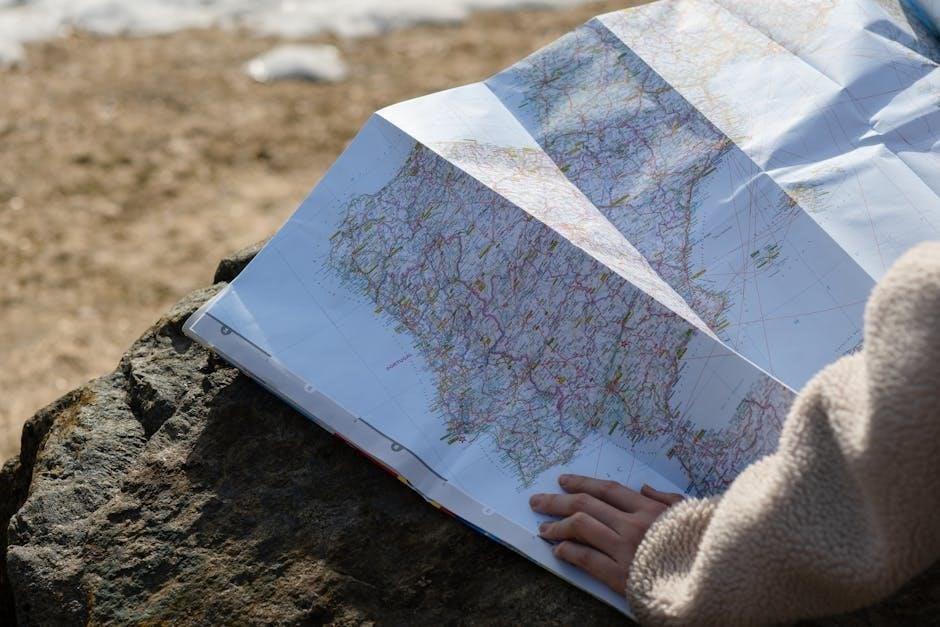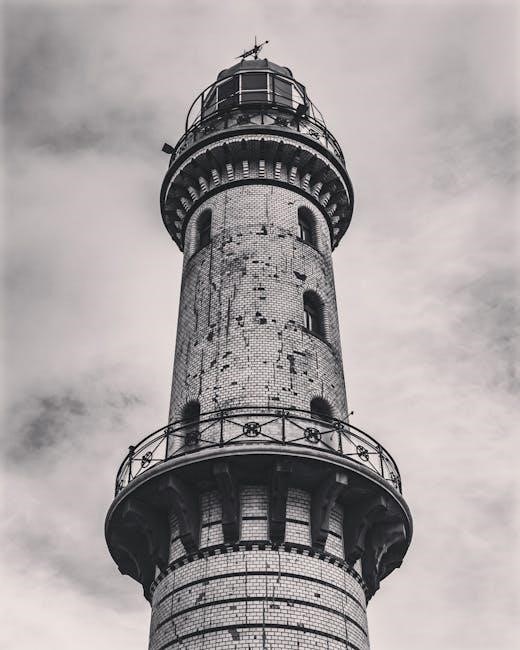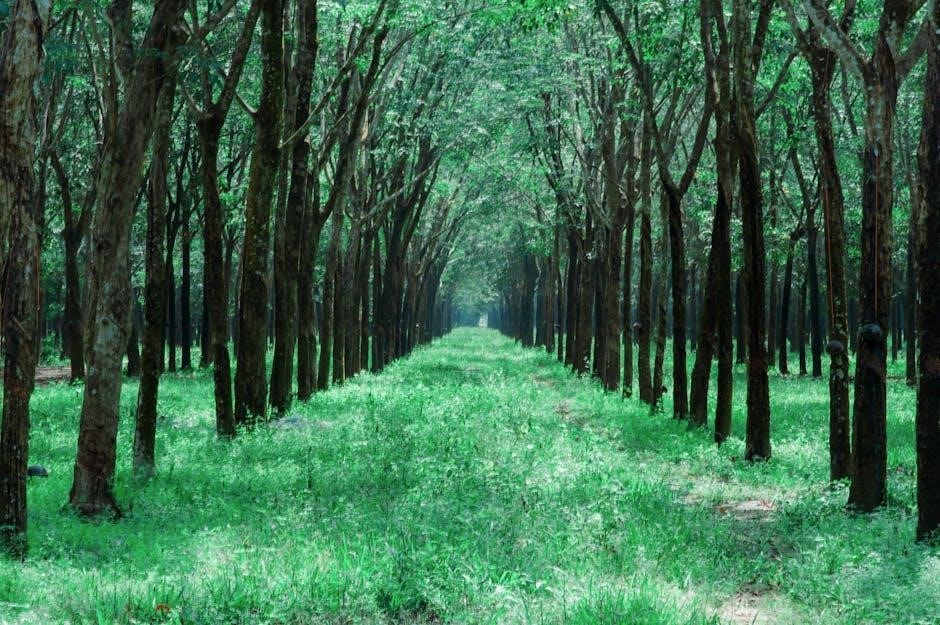the guide peter heller
Introducing “The Guide” by Peter Heller, a gripping thriller set in Colorado’s wilderness. A young guide uncovers dark secrets at an elite fishing lodge, blending suspense with emotional depth and stunning natural beauty.
Overview of “The Guide” by Peter Heller
“The Guide” by Peter Heller is a suspenseful thriller set in the rugged wilderness of Colorado. The story follows a young outdoorsman hired as a guide at an elite fishing lodge, where he uncovers a chilling plot. Blending elements of mystery, nature, and human drama, Heller crafts a gripping narrative that explores themes of isolation, grief, and redemption. The novel combines vivid descriptions of the natural world with a tense, unfolding mystery, showcasing Heller’s mastery of both storytelling and atmospheric prose.
Importance of the Novel in Contemporary Literature
“The Guide” stands out in contemporary literature for its unique blend of suspense, introspection, and environmental themes. Heller’s ability to weave a thrilling narrative with profound explorations of human nature and morality makes the novel resonant. Its focus on isolation, grief, and redemption taps into universal human experiences, while its setting in Colorado’s wilderness underscores the relevance of nature in modern life. The book’s thought-provoking storytelling and lyrical prose cement its place as a significant work in today’s literary landscape, appealing to fans of both thrillers and literary fiction.

Background of Peter Heller
Peter Heller, a Denver-based author and journalist, is known for his lyrical prose and gripping narratives. His work often explores nature, morality, and human connection.
Peter Heller’s Early Life and Career
Peter Heller was born in New York and developed a passion for the outdoors early in life. Before becoming a novelist, he worked as a journalist and editor, contributing to prominent publications like NPR and Outside Magazine. His experiences in nature and storytelling laid the foundation for his unique literary voice, blending adventure with deep emotional resonance. This background heavily influences his writing, particularly in “The Guide”, where wilderness plays a central role. His career transition into fiction marked the beginning of a successful journey in contemporary literature.
His Literary Style and Themes
Peter Heller’s writing is renowned for its lyrical prose and immersive storytelling; His novels often explore themes of survival, morality, and the human condition, set against the backdrop of nature. In “The Guide”, Heller masterfully blends suspense with introspection, creating a narrative that is both a thrilling adventure and a deeply emotional journey. His ability to weave complex characters with vivid descriptions of the wilderness showcases his unique literary style, which captivates readers and draws them into the world he creates. His work often reflects a profound connection between humans and the natural world.
Previous Works and Their Impact
Peter Heller’s previous works, such as “The Dog Stars” and “The River”, have established him as a master of blending literary depth with gripping narratives. “The Dog Stars”, a post-apocalyptic novel, received critical acclaim for its emotional resonance and lyrical prose. “The River”, a tense wilderness thriller, further cemented his reputation as a storyteller who explores human nature and morality. These works have resonated with readers and critics alike, setting the stage for the anticipation surrounding “The Guide”.

The Setting of “The Guide”
“The Guide” unfolds in a remote Colorado fishing lodge, nestled deep within the rugged wilderness. The elite lodge’s isolation and the vast, untamed natural landscape play pivotal roles in the narrative, creating a tense and atmospheric backdrop for the unfolding mystery.
Colorado’s Wilderness as a Character
In “The Guide”, Colorado’s wilderness is more than a backdrop—it’s a living, breathing character. The rugged, untamed landscapes of the Rocky Mountains and the serene yet unforgiving rivers shape the narrative. The vast, isolated environment mirrors the protagonist’s internal struggles, while its beauty and danger drive the plot forward. The wilderness becomes a symbol of both solace and peril, reflecting themes of survival, isolation, and the human connection to nature. Heller’s vivid descriptions bring the Colorado wilderness to life, making it an integral part of the story’s tension and emotional depth.
The Elite Fishing Lodge: A Symbol of Isolation
The elite fishing lodge in “The Guide” serves as a symbol of isolation, both physically and emotionally. Nestled deep in Colorado’s wilderness, the lodge is a remote haven for the wealthy, offering luxury and seclusion. Its exclusivity creates a sense of detachment from the outside world, mirroring the protagonist’s internal estrangement. The lodge’s pristine surroundings and upscale clientele contrast with the darkness beneath its surface, hinting at underlying tensions and secrets. This isolation amplifies the story’s suspense, transforming the lodge into a character that embodies both refuge and entrapment.
The Role of Nature in the Narrative
Nature in “The Guide” is more than a backdrop; it’s a living entity that shapes the story. The Colorado wilderness, with its vast landscapes and untamed beauty, mirrors the protagonist’s emotional journey. The river, forests, and mountains serve as both a refuge and a source of danger, symbolizing the duality of human experience. Heller uses nature to underscore themes of isolation, self-discovery, and the fragility of human existence. The setting enhances the tension, creating a sense of awe and unease that propels the narrative forward and deepens its emotional resonance.

Plot Summary
A young guide at an elite Colorado fishing lodge uncovers dark secrets, leading to a suspenseful journey through betrayal, survival, and self-discovery in the untamed wilderness.
The protagonist of The Guide is a young man grappling with personal grief, seeking solace in the Colorado wilderness. He takes a job at an elite fishing lodge, hoping to escape his past. His rugged, self-reliant nature and deep connection to nature make him a compelling and relatable character. As the story unfolds, his resilience and moral compass are tested, revealing a complex and deeply human figure who embodies both vulnerability and strength.
The Mysterious Plot Unfolds
In the heart of Colorado’s wilderness, the young guide discovers a sinister plot lurking beneath the lodge’s idyllic surface. As he delves deeper, he uncovers secrets tied to the wealthy clientele and the lodge’s isolated setting. Tensions rise as mysterious events escalate, forcing him to confront the darkness head-on. The line between survival and betrayal blurs, propelling the story into a gripping race against time. The unfolding mystery exposes the true nature of the lodge and its inhabitants, testing the protagonist’s resolve and wits.
Climax and Resolution
The climax reaches a boiling point as the guide confronts the masterminds behind the sinister plot, facing a deadly showdown in the isolated wilderness. Tensions peak, and the protagonist must make a choice between survival and justice. In the resolution, the truth is revealed, leaving a lasting impact on all characters. The guide emerges transformed, having navigated moral dilemmas and personal growth. The ending ties together the threads of greed, redemption, and survival, leaving readers reflecting on the novel’s haunting themes and the power of human resilience.

Major Themes in “The Guide”
The novel explores themes of grief, isolation, morality, and survival, delving into human connection and the clash between wealth and wilderness, highlighting societal and personal struggles.
Grief and Redemption

In “The Guide,” Peter Heller masterfully weaves themes of grief and redemption through the protagonist’s journey. The young guide, haunted by personal loss, finds solace in the Colorado wilderness. As he navigates the elite fishing lodge’s secrets, his internal struggles mirror the external dangers. Heller’s prose captures the emotional depth of his character, showing how the pursuit of truth and justice can lead to healing. This duality of pain and hope drives the narrative, making it a compelling exploration of human resilience.
Isolation and Human Connection
In “The Guide,” Peter Heller explores the tension between isolation and human connection. The elite fishing lodge in Colorado’s wilderness serves as a symbol of exclusivity, yet its remote setting forces characters to confront their inner selves and each other. The protagonist, a guide, navigates the complexities of solitude while forming unexpected bonds with the lodge’s clientele. Heller’s portrayal of these dynamics underscores the fragility of human relationships and the enduring need for connection, even in the most isolating environments.
Morality and Survival
In “The Guide,” Peter Heller delves into the intricate dance between morality and survival. The protagonist, grappling with personal grief, faces ethical dilemmas amidst the lodge’s sinister undercurrents. As the plot unfolds, Heller challenges characters to confront their values, questioning what it means to survive—both physically and morally. The novel’s tense atmosphere highlights the clash between self-preservation and ethical responsibility, leaving readers to ponder the true cost of survival in a world teetering on the edge of chaos.

Character Analysis
In “The Guide,” Peter Heller delves into the intricate dance between morality and survival. The protagonist, grappling with personal grief, faces ethical dilemmas amidst the lodge’s sinister undercurrents. As the plot unfolds, Heller challenges characters to confront their values, questioning what it means to survive—both physically and morally. The novel’s tense atmosphere highlights the clash between self-preservation and ethical responsibility, leaving readers to ponder the true cost of survival in a world teetering on the edge of chaos.
The Protagonist: A Complex Hero
The protagonist of “The Guide” is a deeply flawed yet relatable character, driven by personal grief and a connection to the wilderness. As a fishing guide at an elite lodge, he embodies resilience and resourcefulness, yet his past haunts him, shaping his decisions. Heller masterfully portrays his internal struggles, blending vulnerability with quiet strength. His journey is one of self-discovery, where the lines between heroism and survival blur, making him a compelling and human figure in the midst of the novel’s suspenseful narrative.
Supporting Characters and Their Roles
The supporting characters in “The Guide” add depth and complexity to the narrative. Wealthy clients at the lodge represent privilege and isolation, while other guides and locals provide contrasting perspectives. These characters often challenge the protagonist’s worldview, revealing his strengths and vulnerabilities. Heller skillfully uses their interactions to explore themes of class and morality, while also advancing the plot’s suspenseful undertones. Each character, whether a mysterious guest or a seasoned outdoorsman, plays a crucial role in the protagonist’s journey and the unfolding mystery.
Villains and Their Motivations
The villains in “The Guide” are driven by greed, power, and a disregard for ethics. Their sinister plot unfolds in the isolated elite lodge, where wealth and privilege mask dark intentions. Heller crafts these characters with depth, revealing motivations rooted in ambition and control. The protagonist’s discovery of their plan escalates tension, forcing him to confront moral dilemmas. The villains’ actions not only threaten the protagonist but also the fragile balance of the wilderness, adding layers of danger to the story. Their presence underscores the novel’s themes of corruption and survival.

Writing Style and Prose
Peter Heller’s prose in “The Guide” is lyrical and evocative, blending vivid imagery of nature with a taut, suspenseful narrative that captivates readers and immerses them in the story.
Heller’s Use of Language
Peter Heller’s language in “The Guide” is both poetic and precise, weaving vivid descriptions of Colorado’s wilderness with a taut, suspenseful tone. His prose captivates readers by blending lyrical imagery of nature with sharp, economical storytelling. Heller’s ability to evoke the beauty and danger of the environment creates an immersive atmosphere, drawing readers into the world of the story. His writing is both evocative and accessible, balancing descriptive richness with a propulsive narrative that keeps the tension high and the pages turning. This duality underscores his mastery of language in crafting a compelling thriller.
Pacing and Suspense
In “The Guide”, Peter Heller masterfully balances taut pacing with escalating suspense, creating a narrative that keeps readers on edge. The story unfolds with a rhythm that mirrors the protagonist’s emotional journey, blending moments of introspection with heart-pounding action. Heller skillfully ratchets up tension through the vast, unpredictable Colorado wilderness, where the line between beauty and danger blurs. The suspense is heightened by the isolation of the setting, leaving both the protagonist and readers questioning what lies ahead. This balance of pacing and suspense ensures a gripping, unforgettable read.
Descriptive Techniques
Peter Heller’s descriptive techniques in “The Guide” are both evocative and immersive, bringing Colorado’s wilderness to vivid life. His lyrical prose captures the majesty of the Rocky Mountains, the tranquility of rivers, and the eerie silence of the forest. Heller’s descriptions not only set the scene but also mirror the protagonist’s internal state, creating a seamless blend of environment and emotion. The vivid imagery enhances the tension, drawing readers into the remote, breathtaking landscape where beauty and danger coexist, enriching the novel’s atmospheric depth. His writing paints a world as haunting as it is stunning.

Reception and Reviews
“The Guide” has received widespread critical acclaim for its gripping narrative and emotional depth. Readers praise Heller’s vivid storytelling and suspenseful plotting, solidifying its place as a standout thriller.
Critical Acclaim
“The Guide” has garnered high praise for its masterful blend of suspense and literary depth. Critics highlight Heller’s vivid prose, which captures the Colorado wilderness and its isolating beauty. The novel’s ability to weave a gripping thriller with profound explorations of human nature has resonated deeply with readers. Many reviewers have noted how Heller’s storytelling balances action with introspection, making it a standout in contemporary fiction. Fans of The River will appreciate the familiar themes of redemption and survival, while new readers will be drawn to its cinematic and atmospheric style.
Reader Responses
Readers have been captivated by “The Guide”, praising its vivid portrayal of Colorado’s wilderness and its suspenseful, emotionally charged narrative. Many highlight Heller’s ability to blend a gripping thriller with deeper themes of grief and survival. Fans of his previous works, like The River, appreciate the familiar sense of adventure, while newcomers are drawn to the cinematic quality and emotional depth. The novel has left many readers haunted by its haunting setting and thought-provoking themes, making it a memorable read for both longtime fans and new audiences.
Comparisons to Other Thrillers
“The Guide” stands out among modern thrillers with its unique blend of wilderness adventure and psychological depth. Fans of Leif Enger’s I Cheerfully Refuse will appreciate its atmospheric tension, while readers of Heller’s earlier works, like The River, will recognize his signature emotional resonance. The novel shares a kinship with survivalist tales like The Revenant but carves its own path with a haunting, introspective narrative. Its mix of suspense and natural beauty sets it apart in the thriller genre, offering a fresh yet familiar reading experience.

Social and Cultural Commentary
“The Guide” explores class inequalities, environmental degradation, and the pressures of modern society, offering a poignant reflection on human interactions with nature and wealth disparities.
Class and Wealth Disparities
“The Guide” delves into the stark contrasts between the elite and the working class through the lens of a luxurious fishing lodge. The protagonist, a young guide, navigates the intricate dynamics between wealthy clients and the staff, highlighting the power imbalance and social stratification. Heller’s portrayal of the lodge as a symbol of exclusivity underscores the broader themes of privilege and access, offering a poignant commentary on how wealth shapes experiences and opportunities in contemporary society.
Environmental Themes
Peter Heller’s “The Guide” emphasizes the beauty and fragility of Colorado’s wilderness, using the natural landscape to explore themes of conservation and humanity’s impact on the environment. The novel highlights the tension between pristine ecosystems and human exploitation, reflecting broader concerns about environmental degradation. Heller’s vivid descriptions of the wilderness underscore its role as both a setting and a character, urging readers to reflect on the importance of preserving nature in the face of modern encroachments.
Modern Society’s Impact on Individuals
In “The Guide”, Peter Heller examines how modern society’s pressures and isolation shape individuals’ lives. The protagonist’s journey reflects the disconnection many feel from their true selves, seeking solace in nature. Heller’s portrayal of a fractured world mirrors contemporary anxieties, emphasizing the tension between personal identity and societal expectations. The novel critiques how modern life’s demands often lead to emotional and physical retreat, highlighting the human need for escape and redemption in a chaotic world. This theme resonates deeply, offering a poignant commentary on individual struggles in today’s fast-paced society.
Peter Heller’s The Guide is a compelling tale of suspense and redemption in Colorado’s wilderness, blending emotional depth with a gripping mystery, perfect for literary and thriller enthusiasts.
Final Thoughts on “The Guide”
“The Guide” by Peter Heller masterfully combines suspense, emotional depth, and vivid natural descriptions. The novel captures Colorado’s wilderness as a character, blending isolation and human connection seamlessly. Heller’s prose is both poetic and gripping, making the story a standout in contemporary literature. The book’s exploration of grief, redemption, and morality resonates deeply, leaving readers with a lasting impression. It’s a testament to Heller’s skill that he balances thriller elements with profound introspection, creating a truly unforgettable experience.
Recommendation for Readers
“The Guide” is a must-read for fans of literary fiction and thrillers alike. With its vivid portrayal of Colorado’s wilderness, the novel captivates nature lovers and suspense enthusiasts. Heller’s exploration of grief, redemption, and human connection resonates deeply, while his poetic prose elevates the storytelling. Readers seeking a blend of emotional depth and page-turning suspense will find this book unforgettable. It’s an excellent choice for those who appreciate atmospheric settings and morally complex characters, making it a standout in contemporary literature.